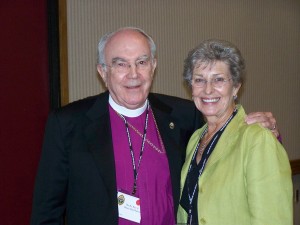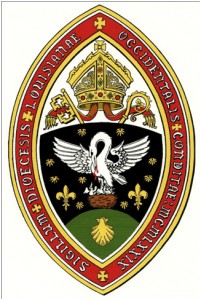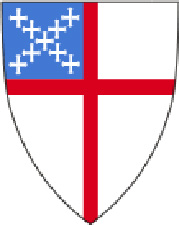
The couple, residents of Alexandria, have been married for 53 years. A native of Winnipeg, Manitoba, Canada, Bishop MacPherson’s family moved to California when he was a teenager. MacPherson met Susan on a “blind date,” and shortly after his high school graduation, the two married. Susan attended Long Beach Community College, and MacPherson earned his degree from Cypress College in Southern California.
For many years, MacPherson worked in the “secular world” in a business management position for the book-publishing division of the Times Mirror Press in Los Angeles, California. After “a real sense of calling” on his life, MacPherson felt God was leading him into the ministry. “I very carefully prayed before making a significant change in my life,” MacPherson recalls.
At the time MacPherson entered seminary, Susan and he had two daughters—Bonnie, then 15, and Heather, then 7 years old. MacPherson completed his degree at Episcopal School of Theology at Claremont in California. He was ordained deacon and priest in 1980. For five years, he served as a bivocational priest, continuing his work in a corporate environment and serving as a hospital chaplain. After leaving the corporate world, MacPherson went into full-time parish ministry. He served congregations in the Diocese of Los Angeles, and from 1988 to 1993, he served as canon to the ordinary and executive officer with Bishop Borsch in Los Angeles.
In January 1993, MacPherson accepted the “call to serve” in the Diocese of Dallas, and he moved his family to Heath, Texas. MacPherson served as canon to the ordinary and executive officer of that diocese. Then in 1999, MacPherson was elected bishop suffragan of the Episcopal Diocese of Dallas. He was consecrated bishop on October 9, 1999, becoming the 949th bishop in the American succession.

When he first started his ministry in Western Louisiana, he spent about four months traveling the diocese, listening to and learning about the people he was called to shepherd. To date, MacPherson continues to travel roughly 750 miles a week to minister throughout the diocese.
Reflecting over the last 10 years of ministry in the Diocese of Western Louisiana, Bishop MacPherson says he is “grateful” for the opportunities he has experienced, “This has been a wonderful place to be, and the best people in the world are here.”
Early on in his ministry, MacPherson says he set working with youth and the development of young people in their “spiritual walk” as priorities. Throughout the last decade, the “engagement of people caring for one another” in the diocese highlights what “true Christianity” is all about, says MacPherson. Although there are too many examples to name each one, MacPherson remembers many that are notable. “Hurricane Katrina affected our diocese quite seriously, and that was followed by Hurricane Rita. At one point, we had 300 people—New Orleans refugees—housed at our camp and conference center,” he says, adding that Susan lived out at the Hardtner Camp and Conference Center in Pollock during that time to coordinate the relief work.
Renovation of Mount Olivet Chapel and the parish house, which now serves as the Diocesan House of the Episcopal Diocese of Western Louisiana, was a project that MacPherson hoped would be accomplished during the time he was serving as bishop. “The project was completed and rededicated about three years ago. My staff and I have chapel there every morning, and every Thursday at 10:00am there is a mass. It had fallen in great disrepair, and was unusable since 1995,” MacPherson notes.
Through a $1.3 million anonymous gift from a parish member, the restoration project was made possible. The chapel and bishop’s office are located on the east side of the Red River in Pineville. The wood frame chapel, a Gothic Revival architecture, survived the Civil War era.
“Mount Olivet Chapel survived the war when Alexandria was burned down because the Northern troops used it as a hospital and field office,” MacPherson says, adding the church was built in 1858. Besides the renovation of Mount Olivet, parish members worked hard on raising funds to refurbish the conference center on the 160-acre Camp Hardtner grounds. In addition, a retreat center for clergy and their families called “The Hermitage” was constructed.
Throughout his tenure in the diocese, Bishop MacPherson says he has seen people reach out to others in a spirit of “true servanthood.” College ministries have expanded and a full-time Episcopalian ministry presence has been established at Grambling University. A mobile medical unit was created in the Shreveport area, and in Alexandria, the Episcopal Diocese of Western Louisiana joined with the Catholic Diocese of Alexandria and the United Methodist Church to establish the Central Louisiana Interfaith Immigration Center. “There has also been an increase of involvement in the Diocese of Western Louisiana in medical missionary work. Two significant mission trips involve work in the Dominican Republic and Honduras,” he says.
“Looking back on my ministry, on how it was 10 years ago, and how it is now, I would say there is a deeper sense of spirituality and understanding of ministry. I think people are addressing their faith and taking their faith more seriously. They are willing to be willing,” notes MacPherson. Although there have been “challenges” with regards to things taking place nationally in the Episcopalian Church, Bishop MacPherson, notes the Diocese of Western Louisiana have worked through those issues, and has “moved forward.” “Nationally, there was tension over some issues, but in Western Louisiana, we have been able to work through that without any congregations leaving, and we are moving forward in a healthy way,” MacPherson notes, adding that in the diocese a process is in place to conduct background checks to ensure a safe environment at all the churches.

As a member of the Rotary Club, Bishop MacPherson will also continue to be active in serving the community through various projects. After nearly 33 years of ordained ministry, serving others is a lifetime commitment, Bishop MacPherson notes. “I have been ‘called’ to the ministry, and that is something you really never retire from,” he adds, not even when he and his wife will ultimately move to Edmund, Oklahoma to be closer to their four grandchildren and one great-grandson.








